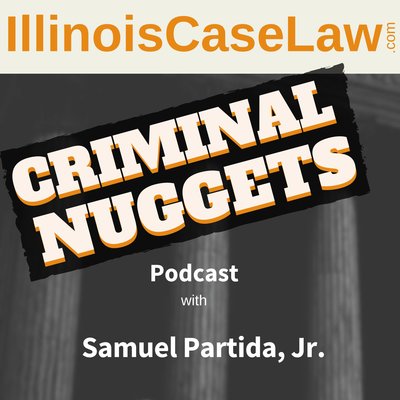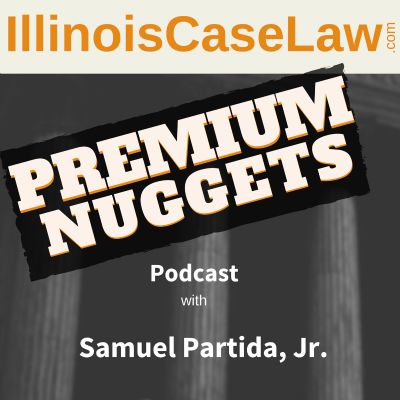May 15, 2019
People v. Foreman, 2019 IL App (3d) 160334 (April). Episode 629 (Duration 5:42)
A felony DWLR can’t be used to sentence and individual as a mandatory X sentence.
Charges & Sentence
After a jury trial, defendant was convicted of unlawful possession of a controlled substance with intent to deliver (720 ILCS 570/401(c)(2)). The trial court sentenced defendant to 9½ years in prison as a Class X offender pursuant to section 5-4.5-95(b).
The unlawful possession of a controlled substance with intent to deliver was a Class 1 felony (1 gram or more but less than 15 grams of cocaine).
Search Warrant
The charges stemmed from the execution of a search warrant at the residence where defendant and another person were living.
Defendant’s Criminal History
Defendant’s PSI showed that defendant was convicted of, among other things, delivery of a controlled substance in 2000, a Class 2 felony, and driving while license revoked (DWLR) in 2009, a Class 2 felony.
Issue
The State argued that defendant was subject to mandatory Class X sentencing under section 5-4.5-95(b) of the Unified Code of Corrections (Unified Code) (730 ILCS 5/5-4.5-95(b)), and defendant disagreed.
Defendant asks that we vacate his sentence and remand this case for a new sentencing hearing.
Defendant Says
Defendant asserts as a matter of statutory interpretation that his prior 2009 DWLR conviction was not a qualifying offense under section 5-4.5-95(b) because
(1) the elements of his 2009 DWLR conviction were equivalent to those of a misdemeanor offense and not a Class 2 or greater felony and
(2) the legislature intended that a defendant’s fifteenth or subsequent DWLR conviction would constitute a Class 2 felony only if the original underlying suspension or revocation was for one of the three enumerated offenses (leaving the scene of an accident involving death or personal injury, driving under the influence, or a statutory summary suspension) and all of the 14 prior DWLR convictions occurred while the defendant was suspended or revoked for that basis, which are not the facts of the 2009 DWLR conviction.
Mandatory X Sentencing
Section 5-4.5-95(b) of the Unified Code provides that:
“When a defendant, over the age of 21 years, is convicted of a Class 1 or Class 2 felony, after having twice been convicted in any state or federal court of an offense that contains the same elements as an offense now (the date the Class 1 or Class 2 felony was committed) classified in Illinois as a Class 2 or greater Class felony and those charges are separately brought and tried and arise out of different series of acts, that defendant shall be sentenced as a Class X offender. This subsection does not apply unless: (1) the first felony was committed after February 1, 1978 (the effective date of Public Act 80-1099); (2) the second felony was committed after conviction on the first; and (3) the third felony was committed after conviction on the second.”
Under section 5-4.5-95(b), Class X sentencing is mandatory—a trial court must sentence a defendant as a Class X offender if the defendant has prior qualifying felony convictions that satisfy the requirements of the statute.
Felony DWLR
The second statute at issue in the present case, section 6-303(d-5) of the Illinois Vehicle Code, provides that:
“Any person convicted of a fifteenth or subsequent violation of this Section is guilty of a Class 2 felony, and is not eligible for probation or conditional discharge, if the revocation or suspension was for a violation of Section 11-401 or 11-501 of this Code, or a similar out-of-state offense, or a similar provision of a local ordinance, or a statutory summary suspension or revocation under Section 11-501.1 of this Code.”
Elements Of The Prior Offense
For the issue raised in this particular case, the language of section 5-4.5-95(b) of the Unified Code is clear and unambiguous. The focus is on the elements of the prior offense.
To constitute a qualifying offense under the statute, the prior offense must contains the same elements as an offense now classified in Illinois as a Class 2 or greater Class felony. Defendant’s 2009 DWLR conviction in the instant case was elevated from a misdemeanor offense to a Class 2 felony based, in part, upon defendant’s prior convictions for DWLR.
Our supreme court has found, however, that those prior underlying convictions do not constitute elements of the offense. See People v. Lucas, 231 Ill. 2d 169, 180-81 (2008) (finding that the prior convictions that served as the basis for a felony DWLR conviction were sentencing enhancements and not elements of the offense).
Elements of DWLR
Rather, the elements of defendant’s prior 2009 Class 2 felony DWLR were that defendant was driving upon a highway of this State and that when he did so, his driver’s license was revoked. See 625 ILCS 5/6-303(a).
Those are the elements of a misdemeanor DWLR offense.
Thus, as defendant asserts, his 2009 DWLR conviction could not be used as a qualifying offense to make him eligible to be sentenced as a Class X offender under section 5-4.5-95(b) of the Unified Code.
Holding
We, therefore, vacate defendant’s sentence and remand this case for defendant to be resentenced as a Class 1 offender.
We affirm defendant’s conviction, vacate defendant’s sentence, and remand this case for the trial court to conduct a new sentencing hearing.
See Also
Episode 133 – People v. Williams, 2016 IL 118375 (January 2016). (The drug enhancement under 720 ILCS 570/408(a) remains “valid” but it doesn’t apply when other sentencing enhancements kick in.)
While the decision here lowers the minimum prison sentence for which defendant is eligible from six years down to four years, the maximum prison sentence for which defendant is eligible would still be 30 years because defendant has a prior conviction under the Illinois Controlled Substances Act.
See 720 ILCS 570/408(a) (stating the any person convicted of a second or subsequent offense under the Illinois Controlled Substances Act may be sentenced to a term of imprisonment of up to twice the maximum term otherwise authorized).



